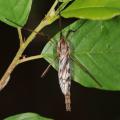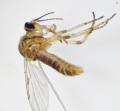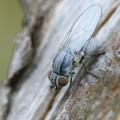Diptera.info :: Identification queries :: Diptera (adults)
Who is here? 1 guest(s)
|
Hybotidae?
|
|
| Nikita Vikhrev |
Posted on 10-10-2005 18:31
|
|
Member Location: Moscow, Russia Posts: 9399 Joined: 24.05.05 |
Small, 2mm or less, near the pond beach, Moscow city, 08 okt. Nikita Vikhrev - Zool Museum of Moscow University |
|
|
|
| Paul Beuk |
Posted on 10-10-2005 19:03
|
|
Super Administrator Location: Netherlands Posts: 19403 Joined: 11.05.04 |
It is a species of Platypalpus but from the pictures I cannot make out which one.
Paul - - - - Paul Beuk on https://diptera.info |
| Nikita Vikhrev |
Posted on 10-10-2005 20:11
|
|
Member Location: Moscow, Russia Posts: 9399 Joined: 24.05.05 |
Thank you Paul. To tell you truth in Netherland's checklist... or elsewhere I didn't find yet any useable difference between Empididae and Hybotidae. Nikita Vikhrev - Zool Museum of Moscow University |
|
|
|
| Paul Beuk |
Posted on 11-10-2005 07:34
|
|
Super Administrator Location: Netherlands Posts: 19403 Joined: 11.05.04 |
If a dance fly has a forked vein R4+5 it is always Empididae. The problematic part when the vein is not forked. The characters given by Chv?la then are: if not, then either prosternum large (fused with episterna) and metapleura distinctly bristles, or costa running around the wing. First antennal segment bristled, at least with a few bristly hairs beneath. Male hyp[opygium symmetrical and unrotated, with discrete gonopods (side lamellae). Within the Empidoidea there is one other family with symmetrical male genitalia, the Atelestidae. That latter family is very small and sarce and you are not likely to come across them (though you surprised us before  ). ). In the other empidoid families, the prosternum is a small sclerite that is separated from the episterna by a membraneous area (except in Dolichopodidae); the costa is not running all around the wing (except in Microphoridae), and the first antennal segment is small and without bristles. All according to Chv?la. In practice, you do not need the key when you get more experience with the genera. In fact, I had to look it up otherwise I would not have known. 
Paul - - - - Paul Beuk on https://diptera.info |
| Nikita Vikhrev |
Posted on 11-10-2005 15:52
|
|
Member Location: Moscow, Russia Posts: 9399 Joined: 24.05.05 |
Thank you very much Paul for your patient explanaition. I'll try to understand it. But as I see the situation now - for newcomer the difference is too difficult, for Dipterist useless as he (she) knows the right genus. Nikita Vikhrev - Zool Museum of Moscow University |
|
|
|
| Kahis |
Posted on 11-10-2005 19:02
|
|
Member Location: Helsinki, Finland Posts: 1999 Joined: 02.09.04 |
Nikita Vikhrev wrote: But as I see the situation now - for newcomer the difference is too difficult, for Dipterist useless as he (she) knows the right genus. That's pretty much the whole story.  Well, since the formal differences can be used to classify new species/genera they are far from useless, but for everyday use they are cumbersome. Many species of different genera acroos Hybotidae and Empididae and very similar in habitus. Wing venation, shape of antenna and position & size of proboscis is usually characteristic at genus level. Well, since the formal differences can be used to classify new species/genera they are far from useless, but for everyday use they are cumbersome. Many species of different genera acroos Hybotidae and Empididae and very similar in habitus. Wing venation, shape of antenna and position & size of proboscis is usually characteristic at genus level. |
| Jump to Forum: |














